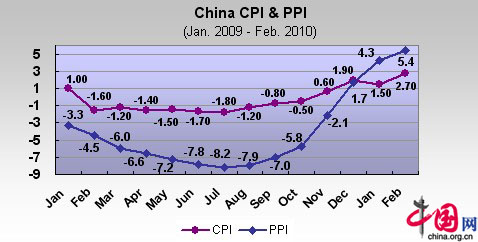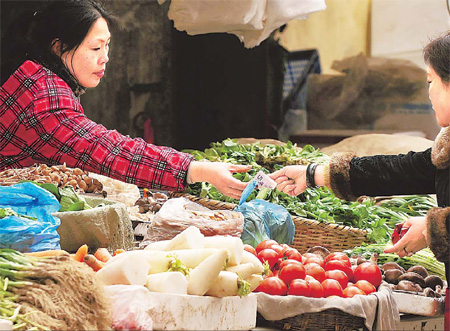CPI rise stokes inflation fears
|
|
|
Business is brisk at a farm produce market in Nanjing, Jiangsu province, on Thursday. Food prices were the driving force behind February's CPI increase. [China Daily] |
A key gauge of inflation rose by a stronger-than-expected 2.7 percent year-on-year in February from 1.5 percent in January - the fastest clip in 15 months - adding pressure on the government to tighten policies.
Given the 2.25 percent one-year interest rate on deposits, the consumer price index (CPI) growth means the real interest rate has returned to negative for the first time since 2008, raising the possibility of an interest rate hike.
The CPI rise was mainly caused by food price increases during Spring Festival. Prices rose by 6.2 percent, compared to 1 percent for non-food prices, the National Bureau of Statistics (NBS) said on Thursday.
Severe weather conditions also drove up food prices, said Sheng Laiyun, NBS spokesman.
Analysts said that given the Spring Festival effect, policymakers should not hasten to tighten policies.
"Only after key figures for March come out should we discuss about a possible rate hike," said Dong Xian'an, chief macroeconomic analyst of Industrial Securities.
Sheng predicted that March CPI will ease as the government takes additional measures to control prices to keep the rate below the government-set 3 percent target.

Some analysts, meanwhile, said even inflation as high as 2.7 percent is not a cause for concern. Zhou Mingjian, analyst with Pacific Securities, said inflation of 3-5 percent is tolerable for a developing nation, as mild inflation is usually caused by economic expansion, and benefits growth by encouraging production and investment. He said it is unnecessary to raise interest rates in the first half of the year, as it could dampen lending and harm recovery.
Hans Timmer, director of the development prospects group at the World Bank in Washington, said in an earlier interview that he would not be concerned even if inflation rose to 5 per cent in China this year.
Ma Jun, chief economist of Greater China at Deutsche Bank Hong Kong, however, said an interest rate hike is necessary given other rising indicators.
Industrial output increased 20.7 percent year-on-year in the first two months, 16.9 percentage points higher than a year ago. Fixed-asset investment rose 26.6 percent, slightly higher than the same period last year. Retail sales increased by 17.9 percent year-on-year in the first two months, and the producer price index, which measures factory-gate prices, went up by 5.4 percent in February.
"Most of these data are stronger than expected and this trend should likely make policymakers tighten monetary, fiscal, exchange rate and real estate policies, as well as restrict financing options for local government-sponsored investments," Ma said.
Wang Qing, chief economist for Greater China, Morgan Stanley, agreed. "The central bank is likely to raise the reserve requirement ratio of commercial banks again, and hike the interest rate by 27 basis points as early as April, before another two lift-ups taking place in the third and fourth quarter."
Total bank lending in February fell to 700.1 billion yuan ($102.6 billion), down by half from January's level, after regulators tightened credit controls, the central bank said on Thursday.
 0
0 







